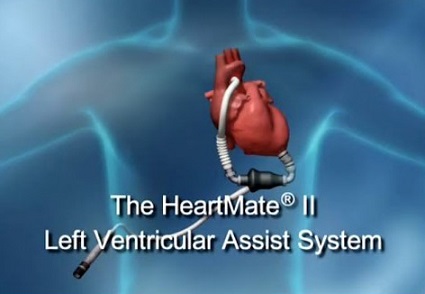BREAKING! Thousands With Abbott’s Heart Device Implanted In Them Notified Of FDA Product Recall Due To 14 Deaths And 273 Reported Injuries!
Nikhil Prasad Fact checked by:Thailand Medical News Team Apr 18, 2024 1 year, 1 week, 1 day, 9 hours, 42 minutes ago
Medical Devices: The urgent announcement by the U.S. Food and Drug Administration (FDA) regarding the recall of heart failure devices has sent shockwaves through the medical community and raised significant concerns among patients and healthcare professionals alike. The devices in question, the HeartMate II and HeartMate 3, manufactured by Thoratec Corp., a subsidiary of Abbott Laboratories, have been linked to 273 injuries and 14 deaths, prompting an urgent recall that affects thousands of patients.
 Thousands With Abbott’s Heart Device Implanted In Them Notified Of
Thousands With Abbott’s Heart Device Implanted In Them Notified Of
FDA Product Recall Due To 14 Deaths And 273 Reported Injuries
Both Abbot and the U.S. FDA could be facing a barrage of legal lawsuits with Abbott expected to bear the cost of urgent surgeries and medical costs for patients already implanted with these devices.
Understanding the HeartMate Devices: Purpose and Functionality
The HeartMate II and HeartMate 3 are crucial
Medical Devices used in the management of severe left ventricular heart failure. These devices serve various purposes, including short- and long-term support for adult patients awaiting heart transplants or those for whom transplantation is not feasible. By replacing the heart's impaired pumping function, these devices ensure continuous blood flow to vital organs, improving patients' quality of life and extending their survival.
The Clotting Risk: Unveiling the Danger
Despite their life-saving potential, both HeartMate devices have been associated with a rare yet critical complication involving the accumulation of biological material leading to obstructions within the devices. Over time, these obstructions can impede blood flow, trigger low-flow alarms, and compromise the devices' effectiveness in supporting cardiac function. The gradual nature of this buildup means that complications may not manifest until years after implantation, posing a significant challenge for early detection and intervention.
FDA's Response: An Urgent Recall and Safety Measures
In response to the escalating concerns and reported adverse events, the FDA has initiated a Class 1 recall, the most severe category indicating a substantial risk of serious injury or death.
This recall encompasses nearly 14,000 HeartMate devices, emphasizing the critical need for heightened vigilance among healthcare providers and patients.
The FDA has underscored the importance of monitoring for low-flow alarms, promptly investigating any signs of obstruction, and considering interventions such as stenting or device replacement to mitigate risks.
https://www.fda.gov/medical-devices/medical-device-recalls/abbottthoratec-corp-recalls-heartmate-ii-and-heartmate-3-left-ventricular-a
ssist-system-lvas-due
Delays and Disclosure: Examining the Communication Gap
One of the key issues highlighted by the recall is the delay in addressing known risks associated with these devices. Safety advocates and medical experts have raised questions about the transparency of information regarding device-related complications and the timeliness of reporting such concerns to regulatory authorities. The recall has prompted discussions about the responsibilities of healthcare professionals, manufacturers, and regulatory agencies in ensuring timely and comprehensive disclosure of potential risks to patient safety.
It was noted that as early as 2022, a study published in the Journal of Thoracic and Cardiovascular Surgery revealed that approximately 3% of patients with these devices experienced blockages, and the risk of obstructions increased as time passed.
https://www.jtcvs.org/article/S0022-5223(22)01042-X/abstract
Despite the study and warnings, the U.S. FDA delayed taking any actions till the number of reported deaths and injuries increased.
They are questions being asked if there was an issue of corruption or bribery at play involving officials concerned at the U.S. FDA.
Impact on Patients and Healthcare Providers: Challenges and Concerns
The implications of the HeartMate recall extend beyond the immediate safety concerns to broader challenges in managing end-stage heart failure. Patients reliant on these devices face heightened uncertainty and anxiety, given the lack of viable alternatives in the event of device removal from the market. Healthcare providers, particularly those specializing in cardiovascular care, are grappling with the dual pressures of ensuring patient safety while navigating the complexities of device recalls and treatment options.
The Road Ahead: Addressing Critical Needs and Ensuring Accountability
Moving forward, stakeholders across the healthcare spectrum must prioritize patient safety, transparency, and accountability. Enhanced communication channels between healthcare providers, device manufacturers, and regulatory agencies are essential to facilitate early detection of device-related issues, prompt interventions, and continuous monitoring of patient outcomes. Moreover, robust post-market surveillance mechanisms and data-sharing initiatives are crucial for identifying emerging risks and implementing proactive measures to safeguard patient health.
Advocating for Patient-Centered Care and Informed Decision-Making
Amidst the challenges posed by the HeartMate recall, the focus remains on delivering patient-centered care and empowering patients with comprehensive information to make informed decisions about their treatment options. Transparent communication, thorough risk assessment, and shared decision-making processes between patients and healthcare teams are fundamental pillars of ethical and effective medical practice.
Collaborative Efforts for Safer Healthcare Ecosystems
The HeartMate recall serves as a stark reminder of the complexities inherent in medical device regulation, patient safety, and healthcare delivery. It underscores the need for collaborative efforts among stakeholders, including clinicians, researchers, regulators, and patient advocacy groups, to foster safer healthcare ecosystems. By fostering a culture of transparency, accountability, and continuous improvement, we can strive towards mitigating risks, enhancing patient outcomes, and advancing the field of cardiovascular medicine responsibly.
Conclusion: Navigating Challenges, Upholding Patient Safety
In conclusion, the FDA's recall of HeartMate devices due to associated injuries and deaths reflects the critical importance of proactive risk management, robust regulatory oversight, and patient-centered care in modern healthcare. While challenges persist, including communication gaps and device-related complexities, collective efforts towards transparency, accountability, and innovation can pave the way for safer and more effective treatments for patients with heart failure. By learning from these experiences, implementing best practices, and prioritizing patient safety above all else, we can navigate challenges and uphold the highest standards of care in cardiovascular medicine.
For the latest on
Medical Devices, keep on logging to Thailand Medical News.
